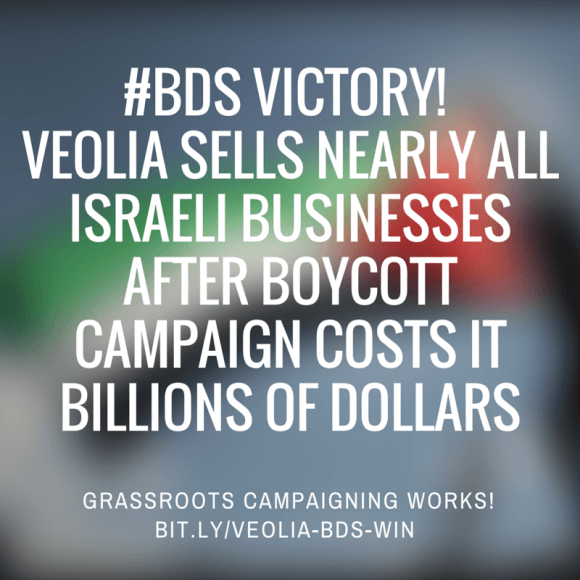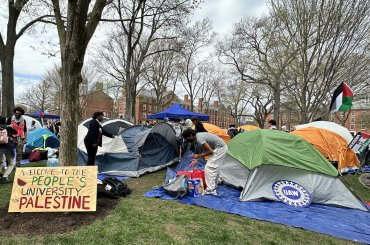
Palestinian civil society activists have heralded the decision by French corporate giant Veolia to sell off nearly all of its business activity in Israel as a huge victory for the global Boycott, Divestment and Sanctions (BDS) movement. The sale follows a worldwide campaign against the company’s role in illegal Israeli settlements that cost the firm billions of dollars of lost contracts.
The boycott Veolia campaign was launched in Bilbao, the Basque Country, in November 2008, to pressure the company to end its involvement in illegal Israeli projects that serve settlements in the occupied Palestinian territory (OPT).
Under BDS pressure, Veolia has failed to win massive contracts with local authorities across Europe, the US and Kuwait. City councils across Europe have passed resolutions excluding the firm from tenders due to its involvement in Israeli human rights violations.
Veolia executives have admitted that the campaign has cost the company “important contracts”, and financial analysts have repeatedly spoken about the financial cost of the campaign to Veolia.
Veolia has now reported that the sale of its water, waste and energy contracts to Oaktree Capital, a Los Angles based investment firm, has been completed, leaving leaving its stake in the illegal Jerusalem Light Rail as its only business interest in Israel.
Mahmoud Nawajaa, the general coordinator of the Palestinian BDS National Committee (BNC), a broad Palestinian civil society coalition that leads the global BDS movement, said:
“Grassroots BDS activism across the world made it very difficult for Veolia to win public contracts in some parts of Europe, the US and the Middle East, leaving the company no choice but to significantly scale back its involvement in illegal Israeli projects.”
“The BDS movement is showing that there is a price to pay for participating in Israel’s colonisation of Palestinian land. One of Europe’s biggest companies has been forced to sell its businesses in Israel that violate international law.”
Around 10 authorities in Ireland and the UK introduced official policy barring Veolia from public contracts. Councils in at least 25 cities including London, Stockholm and Boston opted not to award or renew contracts with Veolia following public campaigns that were backed by local community leaders, churches, trade unions and mainstream political parties.
Many investors including the Dutch ASN Bank and the Quaker Friends Fiduciary Corporation have divested from Veolia over its role in Israeli settlements, while other major banks and the Swedish AP pension fund have issued public statements condemning Veolia’s role in the settlements. Several “socially responsible investment” information providers have told campaigners they have listed the firm as having serious human rights concerns.
Veolia continues to remain involved in the illegal Jerusalem Light Rail that links Israeli colonies to west Jerusalem through its holdings in Veolia Transdev, but has announced its intention to sell its holding in the railway.
In 2014, Veolia stated in letters to BDS organizers that it had also “terminated its involvement in the Tovlan landfill … over three years ago.” Tovlan processes waste from Israel and its illegal settlements in the OPT. This claim was proven to be false, however, by official records obtained from the Israeli Ministry of Environmental Protection in September 2013, which show beyond doubt that the operator of the illegal Tovlan landfill at the time was still Veolia’s subsidiary, T.M.M. Integrated Recycling Services.
Ownership of the Tovlan site and wastewater treatment contracts for illegal Israeli settlements is now expected to transfer to Oaktree.
“By buying up these businesses, Oaktree has become an active accomplice in Israel’s ongoing violations of international law,” Nawajaa added.
Mainly due to boycott pressure on it in the US and Europe, and particularly the campaign’s focus on its “apartheid bus operations,” which served Israel’s illegal settlements, Veolia had sold its entire bus operations in Israel in 2013.
Nawajaa explained that the campaign against Veolia would continue because the firm remains a shareholder in the illegal Jerusalem Light Rail project.
“The sole purpose of the Jerusalem Light Rail is to increase the appeal and facilitate the expansion of illegal Israeli settlements through the theft of Palestinian land. We will continue to boycott Veolia until it ends its participation in the Light Rail project and pays reparations to those Palestinian communities impacted by its support for Israel’s colonization of Palestinian land. International corporations cannot simply profit from Israel’s war crimes and then leave when the going gets tough, without being held accountable,” Nawajaa added.
“We warmly thank the impressive number of principled activists and civil society organizations around the world whose dedicated and strategic efforts have made the campaign against Veolia such a success,” Nawajaa concluded.




next step oaktree..
Bravo. Glad Veolia got the message and evaluated it properly. Money speaks louder to many than morality. Wonder how BDS will fare with the follow-on company.
How about Orange Telecom next?
Great article by Ali: http://electronicintifada.net/blogs/ali-abunimah/how-orange-telecom-supported-israels-massacre-gaza
As some here are fond of quoting Churchill (usually for the wrong reasons), here’s an appropriate one:
“Now this is not the end. It is not even the beginning of the end. But it is, perhaps, the end of the beginning.”
(Said by him in 1942 after the Battle of El Alamein, the first time a British army had defeated a German army in WW2)
“Mainly due to boycott pressure on it in the US and Europe, and particularly the campaign’s focus on its “apartheid bus operations,” which served Israel’s illegal settlements, Veolia had sold its entire bus operations in Israel in 2013.”
Not an accurate assessment. Veolia in 2011 decided to divest from its problematic worldwide public transportation business and sink the relized cash from the divestment in writing down debt and investing into the more profitable water and waste management division. From Wiki:
“… In 2007, the group posted revenues of €5.6 billion in 2007,[2] and sold Veolia Cargo, the rail freight branch of Veolia Transport in 2009 to SNCF and Eurotunnel.[3]
A merger between Veolia Transport and Transdev was announced on 23 July 2009.[4] Transdev was then a subsidiary of Caisse des Dépôts. The merger was completed in March 2011. Veolia Transdev became the world’s private-sector leader in sustainable mobility with more than 110,000 employees in 28 countries.[5]
In July 2011, amid disappointing financial results, Veolia Environnement announced the launch of new restructuring plans and redeployment of assets and businesses.[6] In December 2011, Veolia announced a €5bn divestment program over 2012-2013.[7] As part of this programme, Veolia would divest its participation in Veolia Transdev and exit the transport business altogether.
Until 2011, Veolia had diverse road and rail operations across the globe, employing 72,000 workers worldwide and serving completely or partly about 40 metropolitan areas with more than 1,000,000 inhabitants.”
http://en.wikipedia.org/wiki/Veolia_Transport